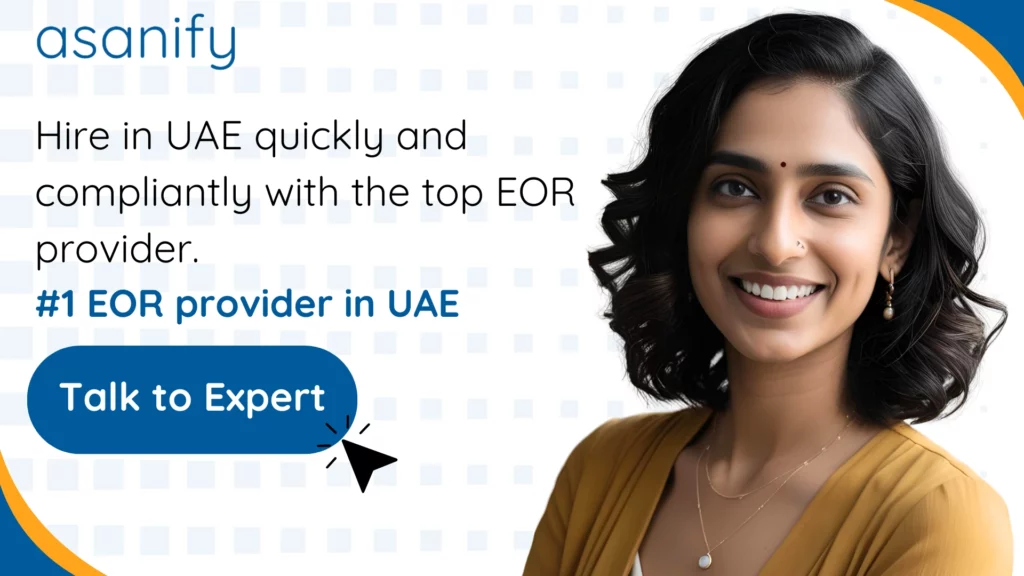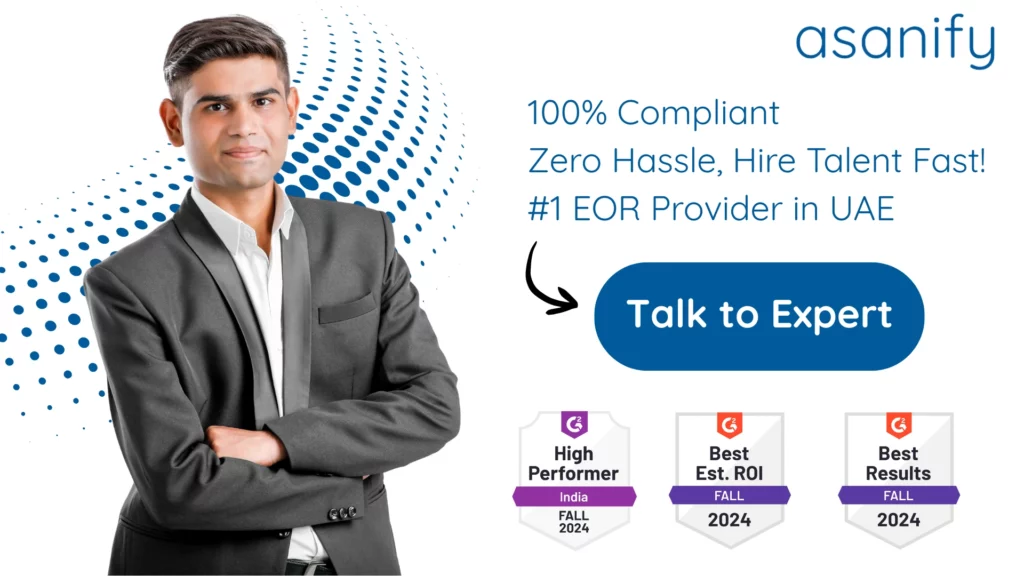The United Arab Emirates (UAE) is a prime destination for global businesses, offering world-class infrastructure, pro-business regulations, and access to top-tier talent. Cities like Dubai and Abu Dhabi attract foreign investment in fintech, SaaS, real estate, and energy. However, hiring in the UAE is complex, involving visa sponsorship, Arabic contracts, WPS salary disbursement, and strict labor compliance. Employers must also navigate mainland vs. free zone rules and sector-specific Emiratisation requirements. To hire legally, foreign companies typically choose between two paths: Entity Establishment in UAE—through a mainland LLC or Free Zone Company—or partnering with an Employer of Record (EOR) who manages legal employment, visas, payroll, and compliance. Each model offers unique advantages in terms of speed, cost, and risk.
Table of Contents
- EOR vs. Setting Up an Entity in UAE
- Key Factors to Consider When Choosing EOR or Entity Setup
- Time to Market and Hiring Urgency in the UAE
- Cost Implications: EOR vs. Entity in the UAE
- Compliance and Legal Costs
- Legal Risk and Employee Compliance in the UAE
- How to Set Up a Legal Entity vs. Use EOR in UAE
- When to Switch from EOR to Entity in the UAE
- Why Choose Asanify as Your EOR in UAE
- Conclusion
- Faqs
EOR vs. Setting Up an Entity in UAE
Choosing between an Employer of Record (EOR) and establishing a legal entity in the UAE is a critical decision for global employers. Each approach offers access to local talent but differs in terms of control, compliance responsibilities, cost, and time to hire.
What is an EOR in the UAE?
An Employer of Record (EOR) acts as the local employer on your behalf. They hire, sponsor, and manage the employee through their own UAE-registered business. Your business retains control over the employee’s work responsibilities, while the EOR assumes all legal and administrative employment obligations—such as issuing visas, providing insurance, processing payroll, and ensuring compliance with labor law.
What is Entity Establishment?
Setting up a legal entity in the UAE requires creating a Free Zone Company or a mainland Limited Liability Company (LLC). This gives you complete control over employment contracts, invoicing, operations, and intellectual property (IP). However, it demands a higher upfront investment, strict compliance, and long setup timelines.
Key Factors to Consider When Choosing EOR or Entity Setup
Before entering the UAE market, companies must weigh their business goals, compliance risk appetite, and operational urgency. Here’s how EOR and entity setup compare across crucial decision-making areas like speed, flexibility, and administrative burden.
1. Speed of Hiring
EOR:
Hiring with an EOR in the UAE typically takes between 10 to 15 business days. The EOR already holds a valid license and has visa quotas in place. This allows them to issue job offers, secure labor approvals, and start onboarding quickly. It’s a great solution for businesses aiming for rapid deployment of staff in sales, tech, support, or marketing roles.
Entity Setup:
Establishing a company in the UAE can take 1 to 3 months or longer, depending on the jurisdiction (mainland vs. Free Zone) and complexity. The process includes choosing the right business activity, obtaining trade licenses, opening a local bank account, applying for a visa quota, and hiring a PRO (Public Relations Officer) to manage immigration and labor documentation.
If your business priority is speed-to-market, EOR is the fastest and most cost-effective solution for hiring in the UAE.
2. Short-Term vs. Long-Term Goals
EOR:
Perfect for short- and mid-term strategies. Use an EOR when:
- Testing the UAE market or running a pilot project
- Hiring only a few employees or remote teams
- Wanting to avoid long-term fixed investment
- Unsure which Emirate or free zone is the best fit
- Planning to scale flexibly based on performance
Entity Setup:
More suited for long-term expansion strategies. Choose this if:
- You’re opening a regional HQ, sales office, or R&D hub
- You require direct control over employment structure and payroll
- You want to issue invoices locally and build brand presence
- You’re applying for government or large enterprise tenders
- You’re interested in owning IP or registering trademarks in the UAE

3. Administrative Overhead
EOR:
Significantly reduces internal overhead. The EOR takes care of:
- Offer letters and MOHRE-compliant Arabic contracts
- Medical insurance and visa sponsorship
- Payroll (through WPS-compliant systems)
- Annual leave tracking, sick leaves, and gratuity
- Employee document renewals and visa cancellations
Entity:
Managing your own entity introduces recurring obligations:
- Trade license renewals and lease agreements
- Hiring or contracting PROs for immigration tasks
- Processing payroll and ensuring timely WPS payments
- Filing labor contracts and MOHRE documents
- Maintaining employee benefits and end-of-service calculations
- Complying with Emiratisation rules for certain company sizes and sectors
Suggested Read: Employer of Record UAE: A Comprehensive Guide 2025
Time to Market and Hiring Urgency in the UAE
The UAE labor market is dynamic, competitive, and fast-moving. Delays in hiring due to regulatory hurdles can affect your business growth in several ways:
- Missed product launch or campaign timelines
- Delayed client onboarding or revenue generation
- Loss of top talent to faster-moving competitors
- Higher costs due to short-term freelance alternatives
- Ineligibility for tenders or license-linked operations
EOR allows you to hire quickly and compliantly without being slowed down by bureaucracy or infrastructure setup.
Cost Implications: EOR vs. Entity in the UAE
Understanding the total cost of employment is essential when hiring in the UAE. While entity setup involves significant upfront and recurring expenses, an EOR offers a streamlined, all-inclusive pricing model that supports faster, more predictable scaling.
Setup and Maintenance Costs
Legal Entity Setup:
- Trade license (Free Zone/Mainland): $5,000–$15,000+ annually
- Local sponsor (Mainland LLC): up to $10,000/year
- Visa quota deposit, security clearance, and immigration card: $2,000–$4,000
- Bank account setup: May require in-person presence
- Office lease (mandatory in most zones): from $2,000/month
- PRO service costs and third-party payroll/HR management fees
EOR Setup:
- No setup fees, deposits, or office space required
- Monthly per-employee cost ranges from $600 to $1,000, depending on benefits and visa type
- Bundled pricing includes payroll, visa, insurance, onboarding, and legal compliance
EOR provides predictable, all-inclusive pricing—ideal for financial planning and fast scaling.

Compliance and Legal Costs
Entity:
- Must ensure compliance with UAE Labor Law, updated in 2022
- Handle mandatory benefits: gratuity (end-of-service), medical insurance, 30 days of paid leave
- Pay salaries via the WPS system
- Draft Arabic labor contracts and file them with MOHRE or relevant Free Zone Authority
- Risk penalties for non-compliance, visa misuse, or late salary payments
EOR:
- EORs keep up with labor law changes and update documentation accordingly
- They bear full responsibility for audits, salary disbursement compliance, and visa-related filings
- Manage end-of-service calculations, paid time off, and sick leave in line with the law
Legal Risk and Employee Compliance in the UAE
UAE employment laws are evolving and highly detailed. Non-compliance can result in:
- Visa bans and employer blacklisting
- Fines for failing to provide health insurance or end-of-service gratuity
- Employee lawsuits in labor courts for wrongful termination or unpaid benefits
- WPS violations, delaying trade license renewals or freezing bank accounts
Common employer obligations include:
- 30 calendar days of paid annual leave after 1 year
- End-of-service gratuity: 21–30 days of salary per year of service
- Medical insurance: Mandatory for all employees
- Arabic contracts: Must be submitted for MOHRE or Free Zone approval
- Visa and Emirates ID renewal every 2–3 years
Partnering with an EOR ensures zero legal exposure, with the provider absorbing all regulatory responsibilities.
How to Set Up a Legal Entity vs. Use EOR in UAE
The path to hiring in the UAE varies greatly depending on your chosen model. Setting up a legal entity involves multiple regulatory steps and infrastructure setup, while using an EOR enables fast, compliant hiring with minimal administrative involvement.
Legal Entity Steps:
- Choose a jurisdiction (mainland or one of 40+ Free Zones)
- Finalize business activity and license type
- Reserve trade name and get initial approval
- Submit Memorandum of Association (MoA) and lease agreement
- Open a local bank account and secure immigration quota
- Hire PRO to process labor cards, contracts, visas, and medicals
- Set up payroll, WPS registration, and HR systems
EOR Steps:
- Choose a trusted EOR partner like Asanify
- Share candidate details, role description, and salary offer
- Asanify issues a compliant employment contract (Arabic + English)
- EOR processes work permit, medical tests, visa, and Emirates ID
- Employee is onboarded in 10–15 business days
- Ongoing payroll, benefits, compliance, and HR support managed by EOR
When to Switch from EOR to Entity in the UAE
Many companies start with an EOR to enter quickly and then transition to a legal entity when operations grow.
When to Switch:
- Your team grows to 10+ employees in the UAE
- You plan to open a physical office or hire local sales staff
- You want to issue local invoices or register for VAT
- You need R&D protection or IP ownership within the UAE
- You’re seeking funding from regional VCs or government bodies
Suggested Read: Pay Contractors in Dubai: The Ultimate Hiring Guide
Transition Process:
- Register your company and obtain trade license
- Set up payroll and compliance systems
- Draft new bilingual employment contracts
- Transfer employee visas and records from EOR to your entity
- Coordinate end-of-service benefit calculations and continuity with EOR
- Inform authorities and clients about your direct presence
Top-tier EORs like Asanify offer full transition support, ensuring legal compliance and uninterrupted operations.

Why Choose Asanify as Your EOR in UAE
Asanify makes hiring in the UAE fast, compliant, and hassle-free. Whether you’re onboarding a fintech analyst in Abu Dhabi, a marketing lead in Dubai, or a remote tech team, we handle everything from bilingual labor contracts and visa processing to WPS-compliant payroll and employee benefits. Our end-to-end EOR solution ensures full legal compliance, transparent pricing with no hidden fees, and dedicated local HR support. With Asanify, you can hire and onboard employees in as little as two weeks—without the need to set up a local entity.
Conclusion
Hiring in the UAE requires navigating complex labor laws, visa rules, and Emiratisation mandates. For fast, compliant market entry, an Employer of Record (EOR) like Asanify enables you to hire within 10–15 business days—without setting up a local entity. It’s ideal for short-term projects, market testing, or remote teams.
In contrast, Entity Establishment in UAE offers full operational control, local invoicing, and long-term brand presence—but with higher costs, longer timelines, and administrative responsibility.
Many companies start with an EOR and later transition to a local entity as their UAE operations grow.
Whether you’re expanding quickly or planning for the long haul, the right model depends on your goals. With Asanify’s expert support, you can scale confidently in the UAE—compliantly, cost-effectively, and without delays.
FAQs
An EOR is a third-party service provider that legally hires and manages your employees in the UAE, taking care of visas, payroll, labor contracts, and compliance.
Typically within 10 to 15 business days, depending on employee documentation and visa clearance.
Yes. EORs sponsor and renew all mandatory work permits, including Emirates ID and medical insurance.
Yes. All employment contracts must be in Arabic (with English translation for reference) and filed with MOHRE or Free Zone Authority.
EOR services typically cost $600–$1,000 per employee/month, inclusive of visa, benefits, payroll, and HR support.
Yes. Once your entity is registered, employees can transition with coordination between the EOR and your new PRO.
Gratuity, insurance, paid leave, proper termination notice, and WPS salary payments.
The EOR calculates, disburses, and documents payroll through WPS, and manages any tax filings if applicable.
Minimum 30 days paid leave, end-of-service gratuity, health insurance, and sick leave.
No. With EOR, your business does not establish a local taxable presence, reducing your regulatory exposure.
Not to be considered as tax, legal, financial or HR advice. Regulations change over time so please consult a lawyer, accountant or Labour Law expert for specific guidance.

